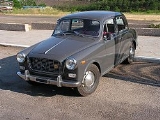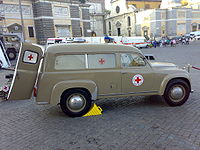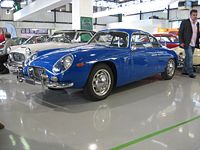
Lancia Appia
Encyclopedia
The Lancia Appia was a car introduced in 1953 as a replacement for the Ardea
and in production for 10 years. The Appia was the last in a long line of Lancia
production cars dating back to the Lancia Lambda
(introduced in 1922) to use the famous sliding pillar front suspension. All three series produced had a V4
engine of 1089 cc.
In addition to the saloons, a number of special bodied Appias were produced, including a Coupe, by Pininfarina, a convertible by Vignale
and an aluminium bodied GT by Zagato
.
The Appia was renowned for its high quality and simple engineering refinement, which helped it gain a deserved reputation for reliability and longevity.
Often overlooked by classic car enthusiasts (and the press) in favour of its more prestigious stable mates the Aurelia and Flaminia, those who own and run these cars know that they are equally deserving of recognition and preservation.
Three series of Appia were built:
A sportier 2-door version was also available.
Approximately 98,000 Appias were built as Berlinas, 3,900 as commercial vehicles and 5,200 supplied to coachbuilders.
. At the Geneva Motor Show in March 1956 the second series was introduced with 3 centimetres (1.2 in) longer wheelbase and a modernized body. In March 1959 the third series was introduced at the Geneva Motor Show with new front end, inspired by the Flaminia
. Between 1960 and 1962 a three-door estate
version was built by Viotto, it was called as Giardinetta.
 Lancia also built light commercial bodies on the Appia chassis: the Furgoncino (Van), Camioncino (pick-up) and an ambulance version the Autolettiga.
Lancia also built light commercial bodies on the Appia chassis: the Furgoncino (Van), Camioncino (pick-up) and an ambulance version the Autolettiga.
built a cabriolet version between 1957 and 1963. Between 1959 and 1961 the Berlina Lusso was also available with styling cues from the cabriolet.
 Zagato
Zagato
built many coupé versions based on the Berlina between 1957 and 1962.
built around 750 cars on the Appia chassis. A Lancia Appia Zagato was raced in the 1959 12 Hours of Sebring
, among the drivers was newsman Walter Cronkite
.
magazine in 1954 had a top speed of 76.1 mph (122.5 km/h) and could accelerate from 0-60 mph (96.6 km/h) in 32.5 seconds. A fuel consumption of 29 mpgimp was recorded. The car was not at the time available on the UK market but an Italian price of 1,328,600 Lire was reported (converted to £780).
Lancia Ardea
The Lancia Ardea was a small sedan produced by the Turin firm between 1939 and 1953. Its unusually short bonnet/hood reportedly contained the smallest V4 engine ever commercialized in an automobile....
and in production for 10 years. The Appia was the last in a long line of Lancia
Lancia
Lancia Automobiles S.p.A. is an Italian automobile manufacturer founded in 1906 by Vincenzo Lancia and which became part of the Fiat Group in 1969. The company has a long history of producing distinctive cars and also has a strong rally heritage. Some modern Lancias are seen as presenting a more...
production cars dating back to the Lancia Lambda
Lancia Lambda
The Lancia Lambda is an innovative automobile produced from 1922 through 1931. It was the first car to feature a load-bearing monocoque-type body, and it also pioneered the use of an independent suspension . Vincenzo Lancia even invented a shock absorber for the car and it had excellent four wheel...
(introduced in 1922) to use the famous sliding pillar front suspension. All three series produced had a V4
Lancia V4 engine
Lancia pioneered the V engine design, producing the first V6 as well as the first V4s. Several different V4 families were produced from the 1920s through 1960s.-Lambda:...
engine of 1089 cc.
In addition to the saloons, a number of special bodied Appias were produced, including a Coupe, by Pininfarina, a convertible by Vignale
Vignale
Vignale was an Italian automobile coachbuilder company. Carrozzeria Alfredo Vignale was established in 1948 at Via Cigliano, Turin by Alfredo Vignale in Grugliasco, near Turin ....
and an aluminium bodied GT by Zagato
Zagato
Zagato is a design consultancy and engineering services company situated just outside Milan, Italy.The company's premises occupy an area of , of which are covered....
.
The Appia was renowned for its high quality and simple engineering refinement, which helped it gain a deserved reputation for reliability and longevity.
Often overlooked by classic car enthusiasts (and the press) in favour of its more prestigious stable mates the Aurelia and Flaminia, those who own and run these cars know that they are equally deserving of recognition and preservation.
Three series of Appia were built:
- 1st series, produced between 1953 and 1956. Only sedan (Berlina] body style built, similar style to the AureliaLancia AureliaThe Lancia Aurelia is a car that was produced by the Italian manufacturer Lancia. Designed by Vittorio Jano, the Aurelia was launched in 1950 and production lasted until the summer of 1958....
.
- 2nd series, produced between 1956 and 1959. Longer wheelbaseWheelbaseIn both road and rail vehicles, the wheelbase is the distance between the centers of the front and rear wheels.- Road :In automobiles, the wheelbase is the horizontal distance between the center of the front wheel and the center of the rear wheel...
, different boot and higher engine power.
A sportier 2-door version was also available.
- 3rd series, produced between 1959 and 1963. New front end with new new horizontal grille and lower bonnet line and more engine power.
Approximately 98,000 Appias were built as Berlinas, 3,900 as commercial vehicles and 5,200 supplied to coachbuilders.
Engines
The Appia has a V4 engine with a 10.2° cylinder angle and a single head for all 4 cylinders.| Model | Production years | Engine | Displacement | Power | Fuel system |
|---|---|---|---|---|---|
| Berlina S.I | 1953-56 | |V4 OHV | 1089 cc | 38 hp | Single carburetor Carburetor A carburetor , carburettor, or carburetter is a device that blends air and fuel for an internal combustion engine. It is sometimes shortened to carb in North America and the United Kingdom.... |
| Berlina S.II | 1956-59 | V4 OHV | 1089 cc | 43 hp | Single carburetor |
| Berlina S.III | 1959-63 | V4 OHV | 1089 cc | 48 hp | Single carburetor |
| Coupé, Cabrio | 1956-63 | V4 OHV | 1089 cc | 53 hp | Single carburetor |
| GTS | 1956-58 | V4 OHV | 1089 cc | 58 hp | Single carburetor |
| Sport | 1960-63 | V4 OHV | 1089 cc | 60 hp | Single carburetor |
C10
Sedan-version C10 was introduced in April 1953 at the Turin Motor Show. The body style was similar to the sister model AureliaLancia Aurelia
The Lancia Aurelia is a car that was produced by the Italian manufacturer Lancia. Designed by Vittorio Jano, the Aurelia was launched in 1950 and production lasted until the summer of 1958....
. At the Geneva Motor Show in March 1956 the second series was introduced with 3 centimetres (1.2 in) longer wheelbase and a modernized body. In March 1959 the third series was introduced at the Geneva Motor Show with new front end, inspired by the Flaminia
Lancia Flaminia
The Lancia Flaminia is a luxury car from the Italian automaker, Lancia, built from 1957 to 1970. It was Lancia's flagship model at that time, replacing the Aurelia. It was available throughout its lifetime as saloon, coupé and cabriolet. The Flaminia coupé and cabriolet were coachbuilt cars with...
. Between 1960 and 1962 a three-door estate
Station wagon
A station wagon is a body style variant of a sedan/saloon with its roof extended rearward over a shared passenger/cargo volume with access at the back via a third or fifth door , instead of a trunk lid...
version was built by Viotto, it was called as Giardinetta.
Commercial variants

Cabriolet/Berlina Lusso
VignaleVignale
Vignale was an Italian automobile coachbuilder company. Carrozzeria Alfredo Vignale was established in 1948 at Via Cigliano, Turin by Alfredo Vignale in Grugliasco, near Turin ....
built a cabriolet version between 1957 and 1963. Between 1959 and 1961 the Berlina Lusso was also available with styling cues from the cabriolet.
GT/GTS/GTE

Zagato
Zagato is a design consultancy and engineering services company situated just outside Milan, Italy.The company's premises occupy an area of , of which are covered....
built many coupé versions based on the Berlina between 1957 and 1962.
- GT same engine as Pininfarina and Vignales models.
- GTS more powerful engine, 2-door version
- GTE had modified body
Sport
ZagatoZagato
Zagato is a design consultancy and engineering services company situated just outside Milan, Italy.The company's premises occupy an area of , of which are covered....
built around 750 cars on the Appia chassis. A Lancia Appia Zagato was raced in the 1959 12 Hours of Sebring
12 Hours of Sebring
The 12 Hours of Sebring is an annual motorsport endurance race for sports cars held at Sebring International Raceway, a former Army Air Force base in Sebring, Florida...
, among the drivers was newsman Walter Cronkite
Walter Cronkite
Walter Leland Cronkite, Jr. was an American broadcast journalist, best known as anchorman for the CBS Evening News for 19 years . During the heyday of CBS News in the 1960s and 1970s, he was often cited as "the most trusted man in America" after being so named in an opinion poll...
.
Performance
An S1 Berlina saloon tested by the British The MotorThe Motor (magazine)
The Motor was a British weekly car magazine founded on 28 January 1903....
magazine in 1954 had a top speed of 76.1 mph (122.5 km/h) and could accelerate from 0-60 mph (96.6 km/h) in 32.5 seconds. A fuel consumption of 29 mpgimp was recorded. The car was not at the time available on the UK market but an Italian price of 1,328,600 Lire was reported (converted to £780).

